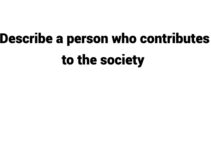Table of Contents
Describe An Occasion When you Heard Someone Complaining About Something In a Restaurant/ Store Or Other Business Places

Cue Card
You should say:
- When and where it happened
- What he/she complained about
- What the result was
- And explain how you felt about the experience
Sample Answer 1
Last month, during my lunch break, I happened to be at a local café when I overheard a conversation that caught my attention. A customer at the next table was complaining about the coffee they had just been served.
The customer was visibly frustrated and complained about two things. Firstly, the coffee was ice-cold, which was definitely not what they had expected. Secondly, their order was incorrect, as they had specifically asked for almond milk instead of regular milk.
The manager, who happened to be nearby, quickly approached the customer and apologized for the inconvenience. He assured them that it was a mistake and offered to replace the coffee with a fresh, hot cup. Additionally, he promised to make the correct order with almond milk.
The customer seemed satisfied with the manager’s response. They appreciated the prompt apology and the willingness to rectify the situation. They accepted the offer of a replacement coffee and decided to wait for the correct order.
As I observed this interaction, I couldn’t help but feel a sense of empathy towards the customer. It’s never pleasant to receive cold coffee or have your order mixed up. However, I also felt a sense of appreciation for the manager’s quick response and willingness to make things right.
This experience reminded me of the importance of good customer service. It’s crucial for businesses to address customer complaints promptly and resolve them in a satisfactory manner. In this case, the manager’s actions not only resolved the issue but also left the customer feeling valued and cared for.
Overall, I felt grateful for witnessing a positive outcome in this situation. It reinforced my belief that good customer service can turn a negative experience into a positive one. It also reminded me of the power of empathy and understanding when dealing with customer complaints.
Sample Answer 2
The incident I recall occurred last November at Shanghai Disneyland, a place known for its magical atmosphere and, unfortunately, its long queues for popular attractions. I was in line for one of these sought-after rides when a commotion ahead caught my attention.
A woman in front of me was visibly upset and proceeded to complain to a nearby staff member. The issue at hand was that a family had bypassed the queue, justifying their action by claiming their child was too small to stand for an extended period. The woman demanded that the staff enforce the queue rules and have the family rejoin the line at the proper place.
The situation escalated as more people in the queue voiced their support for the woman’s complaint, making it clear they shared her frustration with the family’s behavior. Despite the family’s attempts to garner sympathy by highlighting their child’s discomfort, the collective disapproval from the crowd pressured them to retreat and rejoin the line at the back, albeit reluctantly.
Witnessing this, I felt a strong sense of justice being served. It was reassuring to see the community come together to uphold fairness, emphasizing that no one should be exempt from the rules, regardless of the circumstances. This experience reinforced my belief in the importance of standing up against queue jumping. It’s not just about waiting your turn; it’s about respecting the shared agreement we all enter when joining a line. Should I find myself in a similar situation in the future, I would not hesitate to speak up, inspired by the collective action I witnessed that day.
Part 3
1. How do companies train their staff to deal with complaints?
Companies train their staff by providing customer service training, conflict resolution skills, and empathy training to effectively handle complaints.
2. What do people usually complain about?
People usually complain about service quality issues, product defects, and communication breakdowns.
3. How do most people complain, in writing or by other methods?
Most people complain through various channels, including written complaints, verbal complaints, and online feedback.
4. How do people often respond to poor customer service?
People often respond to poor customer service by seeking refunds, writing negative reviews, and expressing dissatisfaction on social media.
5. How would you react if you received a poor service at a restaurant?
If I received poor service at a restaurant, I would express my dissatisfaction politely, provide feedback, and seek a resolution or compensation.
6. Who are more likely to make complaints, older people or younger people?
The likelihood of making complaints may vary based on age demographics, with factors such as communication preferences and service expectations influencing the complaint frequency among older and younger people.
Some IELTS Speaking part 2 cue-cards you may like :
- IELTS Speaking Part 1 From January to April 2024
- IELTS Speaking Part 2 From January to April 2024
- (2024) Describe a Useful Skill That You Learned As a Teenager
- (2024) Describe a Time When You Picked Up An Item That Someone Else Lost
- (2024) Describe a Time You Had To Finish Something Quickly
- (2024) Describe a Trip You Were Looking Forward To But Was Delayed
Credits
Image : Photo by Nafinia Putra on Unsplash


